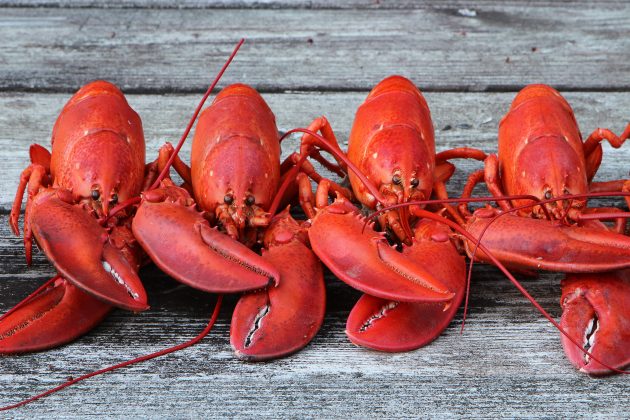
Turning seafood waste into sustainable packaging
By Lilian Schaer for Canadian Food Innovation Network
Research & Development Canadian Food Innovation Network Copol International Food innovation food waste Nova Scotia packaging saputo sustainability Photo © Charles Curtis/Getty
Photo © Charles Curtis/Getty Atlantic Canada’s seafood industry is challenged with how to deal with processing by-products and waste more sustainably. At the same time, the plastics industry is looking for greener packaging alternatives that don’t rely on fossil fuel-based ingredients.
Nova Scotia-based Copol International Ltd., a leading manufacturer of cast polypropylene films for the flexible packaging industry, has teamed up with researchers at the Verschuren Centre for Sustainability in Energy and the Environment to develop a solution that will benefit both industries. The project is part of the Canadian Food Innovation Network (CFIN) Emerging Science Research Cluster.
The result: using lobster shells left over from processing to create a biopolymer that can be incorporated into environmentally friendly packaging with antimicrobial properties to help reduce food waste.
“For us, it’s really all about sustainability and being able to bring the plastics industry and our product – used mainly in produce and bakery items to enhance presentation and extend shelf-life – forward to both prevent food waste and to reduce the impact of plastic on the environment,” says Denis Lanoë of Copol International. “Plastic has a role to play; our customers and their customers want to be sustainable, so we want to be able to help with that and come up with a better solution moving forward.”
Currently, many of the by-products of seafood processing are considered waste product – even though they contain nutrient-rich compounds – and end up in landfills. Not only is that detrimental to the environment, but seafood processors must pay tipping fees for disposal, adding to their operating costs.
“What we are trying to do with the project is to use marine by-products – a waste stream that is generated out of seafood processing – and other under-utilized marine resources to develop functional ingredients,” explains Aishwarya Mohan, who worked on the project during her time as research manager for bioproducts at Verschuren Centre.

Photo © ShaunL/Getty
The research team has developed a green chemistry approach for extracting interesting compounds from seafood waste, examining their properties and evaluating what benefits they might provide.
The biopolymer that they’ve developed using lobster shells and other shellfish waste can be used both as an additive on existing film to extend the shelf-life of fresh produce and bakery items, as well as replacing some of the fossil-based polypropylene that is currently used as an ingredient in the packaging film.
“This is addressing two issues: to take care of the waste products that are generated from the seafood processing and also producing higher value products for niche applications,” she adds. “We have realized some promising results. What we have left to do is continue to work with our collaborators on testing in real food systems.”
According to Lanoë, if even 10 or 20 per cent of the fossil fuel-based ingredients can be replaced by the polymer using seafood waste, it will lead to more environmentally friendly packaging solutions – and a potential boost to the regional economy.
“The biopolymer itself is based on a waste marine product that is locally available so the whole project has very big potential and is very exciting for the whole regional economy,” he says. “Everything is locally sourced and locally based so with a successful outcome, we could actually start developing a biopolymer industry based right here in Nova Scotia.”
The antioxidant properties of the fish peptides identified by the research team at the Verschuren Centre could also be incorporated into beverages and other food applications. A final step in the project involves testing them with dairy products like cheese to determine their suitability for use in dairy products.
Verschuren Centre CEO Beth Mason says her organization translates what happens at the research level into reality for industry partners like Copol. With this project, the cluster funding has brought multiple industry partners together which will ultimately broaden the application of the research itself.
“Generally industry partners wouldn’t have large R&D capacity internally and to get new technologies into industry, you need this type of approach (like the cluster funding) so that you can actually adapt R&D into real life,” Mason says. “We can mediate far greater uptake of R&D by having multiple partners.”
Why is this innovation important?
- Uses a circular economy approach to repurpose marine waste
- Creates sustainable packaging options
- Reduces food waste by extending shelf-life of fresh produce and bakery products
What does this project mean to Canada’s food processing industry?
This project is helping the marine industry extract value from resources that are currently under-used while also supporting the food packaging sector with sustainable alternatives that are better for the environment and can help reduce food waste by extending product shelf life.
About Copol International Ltd.
Nova Scotia-based Copol International Ltd. is a leading manufacturer of cast polypropylene films for the flexible packaging industry. Its products are used extensively in food packaging, especially produce and bakery items.
About Saputo Dairy Products Canada GP
Saputo is one of North America’s leading dairy processors. The company produces, markets, and distributes a wide array of dairy products, including cheese, fluid milk, extended shelf-life milk and cream products, cultured products and dairy ingredients.
About the project team
Dr. Beth Mason is the chief executive officer of the Verschuren Centre where she leads the research team in developing innovative solutions for clean energies, agri-marine industries, aquaculture clusters, and nano-technology applications. She holds an undergraduate degree from Edinburgh University in Scotland and obtained both her master’s and PhD in animal nutrition and physiology from the University of Alberta.
Aishwarya Mohan was previously the research manager for bioproducts at the Verschuren Centre. She completed an undergraduate degree in agriculture and a master’s degree in food science, both at Dalhousie University in Nova Scotia.
Denis Lanoë is vice-president of operations and general manager of Copol International Ltd. A professional engineer (P.Eng), he holds an undergraduate degree in engineering as well as an MBA from Dalhousie University in Nova Scotia.
The Canadian Food Innovation Network Emerging Science Research Cluster is funded in part through the AgriScience Program under the Canadian Agricultural Partnership, a federal-provincial-territorial initiative. For more information, contact Laura Sider, science co-ordinator, CFIN.
Print this page